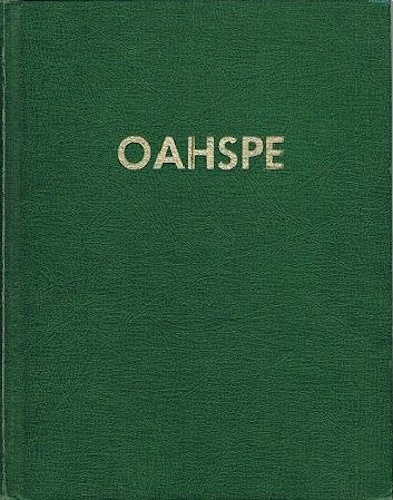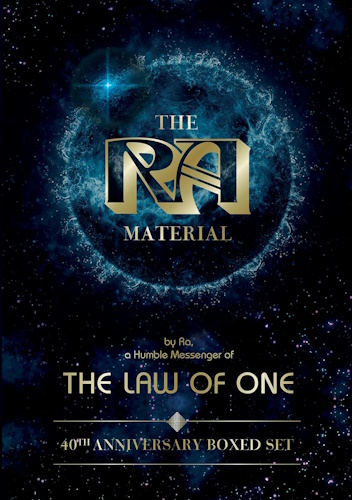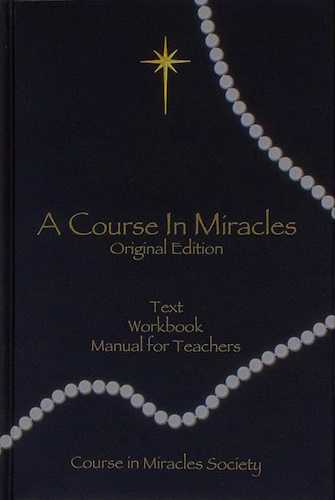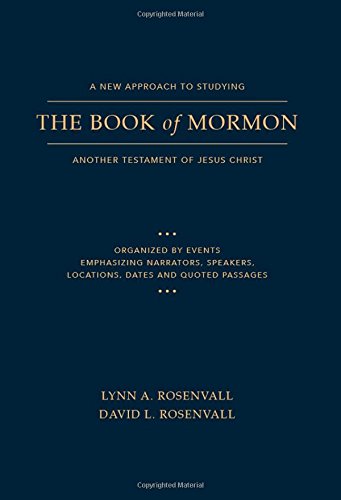
![]()
![]()
Book of Cosmogony and Prophecy
Chapter II
1. THERE are two known things in the universe: ethe and corpor. The former is the solvent of the latter.
2. For comparison, take a lump of table-salt, which, though white, is impervious to the sight of man. Cast it into water, and it is lost to sight; though it still existeth, the sight of man can see through it.
3. Earth substance, as such, is equally soluble in ethe. And the great etherean firmament is thus constituted; being a dense solution of corpor. In the main, etherea is transparent; but in some places translucent, and in others, opaque.
4. Here are iron, and copper, and granite, and water, and lead, and clay, and nitrogen, and oxygen, and hydrogen, and various other kinds of corporeal substances, as known on the earth, and besides these, millions of things not known on the earth. And ethe holdeth them in solution; even
p. 573
after the manner that the air holdeth the substance of clouds, which is water in solution. And as some clouds are so rarified as to be imperceptible, whilst others are opaque, and even black, so are the comparative conditions of etherea; of which matters more will be said further on.
5. In the case of a vortex in etherea (that is after the manner of a whirlwind on the earth), the corporeal solutions are propelled toward the centre thereof in greater density.
6. When it is sufficiently dense to manifest light, and shadow, it is called a comet, or nebula; when still more dense it is a planet.
7. When as a comet (or nebula) the m'vortex hath not attained to an orbit of its own, it is carried in the currents of the master vortex, which currents are elliptic, parabolic and hyperbolic. (See cut C, Fig. 4.) Hence the so-called eccentric travel of comets.
8. At this age of the comet, it showeth nearly the configuration of its own vortex; its tail being the m'vortexya. If it appear to the east of the sun its tail turneth eastward; if west of the sun, it turneth westward.
9. Two directions of power are thus manifested; and also two powers: First, that the vortex of the sun hath power from the east to west, and from the west to east, to which the comet is subjected: Second, that the comet hath a vortex of its own, which is sufficient under the circumstances to maintain the general form of the comet. The ordinary comet hath its tail away from the sun, but some comets have two tails, one toward the sun and one away. In the case of Biela's comet in the year 4 B.K. (1846 A.D.), which was broken whilst the observer was looking on, is sufficient evidence of the sub-power of the comet vortex.
10. Interior nebula is generally described as comets; whilst exterior nebula is usually called nebula. Nevertheless, all such solutions of corpor are of like nature, being as the beginning or as the incomplete condensation of a planet.
11. They do not all, nor half of them, ripen into planets. But their vortices are often broken and they return again into sublimated solutions, and are lost to mortal sight.
12. But nowhere in etherea is there a solution of corpor sufficient to put itself in motion; nor sufficient to condense itself; nor to provide the road of its travel. But its road of travel showeth the direction of the lines of the sun's vortex. Save and except in such case when a comet's vortex cometh within the vortex of another planet's vortex of greater power than its own.
13. As a cyclone, or whirlwind, on the earth, traveleth with the general current of the wind, so travel the sub-vortices in etherea within the axial lines of vortices in chief.
14. Whether within the sun's vortex, or external thereto, the rules apply, so far as nebula or comets are concerned, and the vortices that carry them.
15. Axial velocity belongeth to all of them; and the tendency of all of them is to orbits; the which they attain to or not, according to their strength compared to the master.
16. When a nebulous planet is sufficiently dense to have its corpor polarized, but so that its polarity correspondeth to the polarity of the master, it is transparent, and possesseth no eclipse power.
17. But when nebula is polarized transversely, it is as a cloud in etherea, with power to eclipse stars; and even to eclipse the sun itself, provided it be within the solar vortex.
18. Of external nebulae, of sufficient size to be self-sustaining, and to ultimately become planets, there are at present visible from the earth more than eight thousand. These are in process of globe-making, even as the earth was made. Of nebulae within the sun's vortex, where they are usually called comets, there are upward of eight or ten new ones every year. Some of them survive but a few months, some a few years; some a hundred years; and some even a thousand or more years. But in all cases when the vortex of one of them bursteth, the corpor of the comet flieth instantly into dissolution more sublimated, and is lost to mortal sight.
19. Where nebula is transparent and lieth between the earth and master centre it is not discernible, either with the naked eye or with a telescope. Amongst the most sublimated forms of corpor in solution are nitrogen, oxygen and hydrogen. When a sub-vortex, or even a stratum of ten or twenty million miles, of this solution lieth between the earth and sun centre, and an observation of the sun be taken, the observer is apt to erroneously suppose he hath discovered nitrogen, oxygen and hydrogen in the sun atmosphere or photosphere. And if the solution contain iron and gold and platina, and other metals, the observer is apt to erroneously suppose he hath discovered these things within the photosphere or atmosphere of the sun.
20. Wherefore all observations made to determine such matters require
p. 574
that the observer shall first understand what lieth between the earth and the sun at the time of observation.
21. But some of these sub-vortices in etherea, require forty years' time in which to drag their whole length away from the line of observation. So that in no case is the observation of any value, even though it be taken the breadth of the earth, unless it covereth a period greater than forty years. But it also so happeneth that, perhaps, when such an immense vortex is about passing away from the line, that another one, equally large, and perhaps of different density of solution, cometh within the line. And it may thus occur that hundreds of years will elapse before a good view of the sun can be obtained. Some of these traveling plateaux are opaque (dark), so that the sun is kept in a dim eclipse for a year or two, and sometimes for hundreds of years.
22. Wherefore philosophers have erroneously attributed their observations as having proved certain gases and certain metals within the sun's atmosphere.
23. The same remarks apply to observations made of the stars; and even of the moon.
24. In the case of light being manifested in a complete steel magnet, the major retention is at the angle of the two legs, and the minor light at the terminus of the north leg (negative pole). But in an eccentric magnet (horseshoe) the two lights are manifest at the terminus of the two legs.
25. A complete planetary vortex is a globe, or nearly so, and its manifested light like a complete magnet. But an immature vortex, as in the case of a comet or other small vortex, will manifest light at both poles, and sometimes in the middle, if it hath attained to power to manufacture light of its own. In some cases the comet or the nebula is not sufficiently condensed to produce light of it own, but containeth corpor in a gaseous state which of itself may have infinitesimal polarities refracting the normal light of the master vortex.
26. By observing the new moon, it will be seen that the light portion thereof describeth a larger circle than the dark portion. The bulge of the light side of the moon always pointeth toward the sun. It is an error to say that light cometh from the sun and striketh on the moon, and is then reflected on the earth. As previously shown, there is no such thing or substance as light; but that which is called light is a manifestation of vortexian power; also that the c'vortex is comparatively all one light, with a central focus. The reason one side of the moon is dark and one light, is because it hath a positive and negative manifestation of the c'vortexya; for the moon also manufactureth its own light.
27. As the moon advanceth to the next quarter, the same discrepancy in the two apparent sizes is manifest; and this continueth until it is full moon. It is an error to say that dark bodies appear smaller, and light bodies larger, because of absorption, or refraction. The cause is not absorption, or refraction, or reflection, but of manufacture.
28. Light bodies (so-called) manufacture light of their own, ever so infinitesimal, which is as an envelope external to themselves. The eye of the observer seeth this as well as the corporeal body, and consequently it appeareth larger than it really is.
29. The same rule applieth in regard to the sun and his photosphere, and to comets, and to all bodies that manifest light. Suitable deduction must be made, in endeavoring to determine the size of a planet.
30. Shadow is usually divided into two expressions, UMBRA, as the shadow of a man standing in sunlight; and DARKNESS, as the shadow of the earth in a cloudy night. Nevertheless, they are but one and the same thing, but in different degrees, both of which are here included in the word shadow. In a clear night, when the full moon shineth, two conditions are manifest on the earth: first, that a shadow is vertical to the moon, and the light side is not as light as when the sun shineth at noon.
31. The density of shadow from sunlight and the density of shadow from moonlight correspond exactly to the comparative difference between sunlight and moonlight.
32. When it is full moon at midday, the light of the sun (so-called) is no greater because of the moon's presence. Observe the difference, however, on a given object if the ray from a mirror facing the sun be added to the ordinary sunlight. Hence it is an error to attribute the moon's rays as being reflected from the sun to the earth. If it be premised that the light face of the moon is not a mirror, but is opaque, observe the following result from the moon when it is half full: The half of the moon is equivalent to half a globe; if the light of the sun fell on the bulge, the rays thus landed on the moon would cause that
p. 575
part of the moon to be a trifle more than four times lighter (or brighter) than on the slopes.
33. In an observation of this kind, and if the light were borrowed from the sun, two kinds of rays would result; the bulge of the moon would afford a centre for rays to emanate in very direction; and the slope rays would refract at the same angle as received from the sun.
34. The fact is, however, there is no intense centre light manifested on the moon's surface, in the place where it directly faceth the sun. Hence there is no possiblity of the light of the moon being produced by light from the sun, or from the sun's centre. The light of the moon faceth the sun centre, but the latter is not the cause thereof, the cause is in the emissions of positive and negative currents from the moon's vortex, and they manifest in the m'vortexya of the master.
35. The same rules apply to all planets whose vortices are negative.
-
Urantia Book, 44:0.11 - The Celestial Artisans
Never in your long ascendancy will you lose the power to recognize your associates of former existences. Always, as you ascend inward in the scale of life, will you retain the ability to recognize and fraternize with the fellow beings of your previous and lower levels of experience. Each new translation or resurrection will add one more group of spirit beings to your vision range without in the least depriving you of the ability to recognize your friends and fellows of former estates.
-
Princess Bride 1987 Wallace Shawn (Vizzini) and Mandy Patinkin (Inigo Montoya)
Vizzini: HE DIDN'T FALL? INCONCEIVABLE.
Inigo Montoya: You keep using that word. I do not think it means what you think it means. -
Urantia Book, 117:4.14 - The Finite God
And here is mystery: The more closely man approaches God through love, the greater the reality -- actuality -- of that man. The more man withdraws from God, the more nearly he approaches nonreality -- cessation of existence. When man consecrates his will to the doing of the Father's will, when man gives God all that he has, then does God make that man more than he is.
-
Urantia Book, 167:7.4 - The Talk About Angels
"And do you not remember that I said to you once before that, if you had your spiritual eyes anointed, you would then see the heavens opened and behold the angels of God ascending and descending? It is by the ministry of the angels that one world may be kept in touch with other worlds, for have I not repeatedly told you that I have other sheep not of this fold?"
-
Urantia Book, Foreword - 0:12.12 - The Trinities
But we know that there dwells within the human mind a fragment of God, and that there sojourns with the human soul the Spirit of Truth; and we further know that these spirit forces conspire to enable material man to grasp the reality of spiritual values and to comprehend the philosophy of universe meanings. But even more certainly we know that these spirits of the Divine Presence are able to assist man in the spiritual appropriation of all truth contributory to the enhancement of the ever-progressing reality of personal religious experience—God-consciousness.
-
Urantia Book, 1:4.3 - The Mystery Of God
When you are through down here, when your course has been run in temporary form on earth, when your trial trip in the flesh is finished, when the dust that composes the mortal tabernacle "returns to the earth whence it came"; then, it is revealed, the indwelling "Spirit shall return to God who gave it." There sojourns within each moral being of this planet a fragment of God, a part and parcel of divinity. It is not yet yours by right of possession, but it is designedly intended to be one with you if you survive the mortal existence.
-
Urantia Book, 1:4.1 - The Mystery Of God
And the greatest of all the unfathomable mysteries of God is the phenomenon of the divine indwelling of mortal minds. The manner in which the Universal Father sojourns with the creatures of time is the most profound of all universe mysteries; the divine presence in the mind of man is the mystery of mysteries.
-
Urantia Book, 1:4.6 - The Mystery Of God
To every spirit being and to every mortal creature in every sphere and on every world of the universe of universes, the Universal Father reveals all of his gracious and divine self that can be discerned or comprehended by such spirit beings and by such mortal creatures. God is no respecter of persons, either spiritual or material. The divine presence which any child of the universe enjoys at any given moment is limited only by the capacity of such a creature to receive and to discern the spirit actualities of the supermaterial world.
-
Urantia Book, 11:0.1 - The Eternal Isle Of Paradise
Paradise is the eternal center of the universe of universes and the abiding place of the Universal Father, the Eternal Son, the Infinite Spirit, and their divine co-ordinates and associates. This central Isle is the most gigantic organized body of cosmic reality in all the master universe. Paradise is a material sphere as well as a spiritual abode. All of the intelligent creation of the Universal Father is domiciled on material abodes; hence must the absolute controlling center also be material, literal. And again it should be reiterated that spirit things and spiritual beings are real.
-
Urantia Book, 50:6.4 - Planetary Culture
Culture presupposes quality of mind; culture cannot be enhanced unless mind is elevated. Superior intellect will seek a noble culture and find some way to attain such a goal. Inferior minds will spurn the highest culture even when presented to them ready-made.
-
Urantia Book, 54:1.6 - True And False Liberty
True liberty is the associate of genuine self-respect; false liberty is the consort of self-admiration. True liberty is the fruit of self-control; false liberty, the assumption of self-assertion. Self-control leads to altruistic service; self-admiration tends towards the exploitation of others for the selfish aggrandizement of such a mistaken individual as is willing to sacrifice righteous attainment for the sake of possessing unjust power over his fellow beings.
-
Urantia Book, 54:1.9 - True And False Liberty
How dare the self-willed creature encroach upon the rights of his fellows in the name of personal liberty when the Supreme Rulers of the universe stand back in merciful respect for these prerogatives of will and potentials of personality! No being, in the exercise of his supposed personal liberty, has a right to deprive any other being of those privileges of existence conferred by the Creators and duly respected by all their loyal associates, subordinates, and subjects.
-
Urantia Book, 54:1.8 - True And False Liberty
There is no error greater than that species of self-deception which leads intelligent beings to crave the exercise of power over other beings for the purpose of depriving these persons of their natural liberties. The golden rule of human fairness cries out against all such fraud, unfairness, selfishness, and unrighteousness.






























